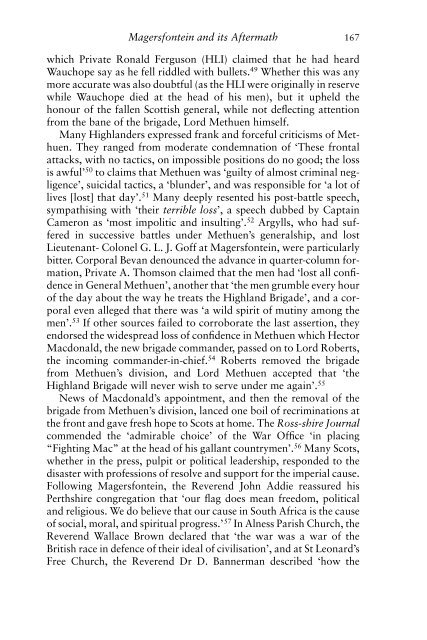The Scottish soldier and Empire, 1854-1902 - Reenactor.ru
The Scottish soldier and Empire, 1854-1902 - Reenactor.ru
The Scottish soldier and Empire, 1854-1902 - Reenactor.ru
You also want an ePaper? Increase the reach of your titles
YUMPU automatically turns print PDFs into web optimized ePapers that Google loves.
Magersfontein <strong>and</strong> its Aftermath 167<br />
which Private Ronald Ferguson (HLI) claimed that he had heard<br />
Wauchope say as he fell riddled with bullets. 49 Whether this was any<br />
more accurate was also doubtful (as the HLI were originally in reserve<br />
while Wauchope died at the head of his men), but it upheld the<br />
honour of the fallen <strong>Scottish</strong> general, while not deflecting attention<br />
from the bane of the brigade, Lord Methuen himself.<br />
Many Highl<strong>and</strong>ers expressed frank <strong>and</strong> forceful criticisms of Methuen.<br />
<strong>The</strong>y ranged from moderate condemnation of ‘<strong>The</strong>se frontal<br />
attacks, with no tactics, on impossible positions do no good; the loss<br />
is awful’ 50 to claims that Methuen was ‘guilty of almost criminal negligence’,<br />
suicidal tactics, a ‘blunder’, <strong>and</strong> was responsible for ‘a lot of<br />
lives [lost] that day’. 51 Many deeply resented his post-battle speech,<br />
sympathising with ‘their terrible loss’, a speech dubbed by Captain<br />
Cameron as ‘most impolitic <strong>and</strong> insulting’. 52 Argylls, who had suffered<br />
in successive battles under Methuen’s generalship, <strong>and</strong> lost<br />
Lieutenant- Colonel G. L. J. Goff at Magersfontein, were particularly<br />
bitter. Corporal Bevan denounced the advance in quarter-column formation,<br />
Private A. Thomson claimed that the men had ‘lost all confidence<br />
in General Methuen’, another that ‘the men g<strong>ru</strong>mble every hour<br />
of the day about the way he treats the Highl<strong>and</strong> Brigade’, <strong>and</strong> a corporal<br />
even alleged that there was ‘a wild spirit of mutiny among the<br />
men’. 53 If other sources failed to corroborate the last assertion, they<br />
endorsed the widespread loss of confidence in Methuen which Hector<br />
Macdonald, the new brigade comm<strong>and</strong>er, passed on to Lord Roberts,<br />
the incoming comm<strong>and</strong>er-in-chief. 54 Roberts removed the brigade<br />
from Methuen’s division, <strong>and</strong> Lord Methuen accepted that ‘the<br />
Highl<strong>and</strong> Brigade will never wish to serve under me again’. 55<br />
News of Macdonald’s appointment, <strong>and</strong> then the removal of the<br />
brigade from Methuen’s division, lanced one boil of recriminations at<br />
the front <strong>and</strong> gave fresh hope to Scots at home. <strong>The</strong> Ross-shire Journal<br />
commended the ‘admirable choice’ of the War Office ‘in placing<br />
“Fighting Mac” at the head of his gallant countrymen’. 56 Many Scots,<br />
whether in the press, pulpit or political leadership, responded to the<br />
disaster with professions of resolve <strong>and</strong> support for the imperial cause.<br />
Following Magersfontein, the Reverend John Addie reassured his<br />
Perthshire congregation that ‘our flag does mean freedom, political<br />
<strong>and</strong> religious. We do believe that our cause in South Africa is the cause<br />
of social, moral, <strong>and</strong> spiritual progress.’ 57 In Alness Parish Church, the<br />
Reverend Wallace Brown declared that ‘the war was a war of the<br />
British race in defence of their ideal of civilisation’, <strong>and</strong> at St Leonard’s<br />
Free Church, the Reverend Dr D. Bannerman described ‘how the

















